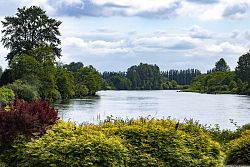

Between 7-10 June over 2,600 volunteers across the UK measured the water quality of their local rivers as part of the Great UK WaterBlitz.
The Great UK WaterBlitz is a biannual campaign which intends to fight for healthy freshwater in the UK. It is championed by FreshWater Watch who are the largest citizen science water quality testing programme in the UK. As part of their work they train communities to use their water monitoting kits to measure water pollution levels and report back.
The latest WaterBlitz managed to collect over 1,300 datasets to create a snapshot of river health across the UK. Measurements were taken of nitrates and phosphates, which are two polluting nutrients that are commonly found in both treated and untreated sewage, and fertiliser wash-off from farmland.
These nutrients are important to monitor as heightened levels of them can lead to high levels of bacteria, an excess of algae growth and in turn decreased water oxygen levels which can lead to the death of plants and animals. The higher the levels of nutrient pollution, the less likely a river is able to sustain aquatic wildlife, important insects, and mammals.
The findings are sadly shocking, with 75% of all data points tested showing poor river ecological health.
72% of measurements found unacceptable levels of nitrates in rivers, and 27% found unacceptable concentrations of phosphate.
Their results mirror findings of the Environment Agency, who declared that only 14% of river meet a 'good' ecological status.
There were significant regional variations in the Great UK WaterBlitz findings.
The worst water quality was found in the Anglian and Thames river basin districts where 89% of data points found poor ecological health.
Although the areas showing the 'best health' still leave a lot to be desired. The Solway Tweed river basin district was deemed to have the best health overall, with 50% of data points showing unacceptable levels of nutrient pollution.
River water quality also varied across England, Wales and Scotland. England was found to have the worst water quality with 78% of measurements showing unacceptable levels of nutrient pollution. This compares to 51% in Scotland and 53% in Wales. There were too few data points tested in Northern Ireland to draw conclusions of the quality there.
Dr Sasha Woods, director of science and policy at Earthwatch Europe, commented on the findings: "These results are truly disturbing – there are no parts of the UK unaffected by nutrient pollution . . . our rivers have been historically stressed by farming, and we’re seeing this being made worse by inappropriate or limited sewage treatment.
"There is a pressing need for both improvements to wastewater treatment processes and reductions in agricultural pollution to reduce threats to vulnerable freshwater systems. The government has committed to protect 30% of land for nature by 2030 – that will be meaningless if the rivers and streams running through the land, the arteries of life, are diseased."
The finding of the Great UK WaterBlitz have been passed on to the Environment Agency.
For more information on the findings, see the Great UK WaterBlitz Report.
If you're interested in getting involved in the next Great UK WaterBlitz, this will run in September. You can register your interest on the Eartwatch website, here.